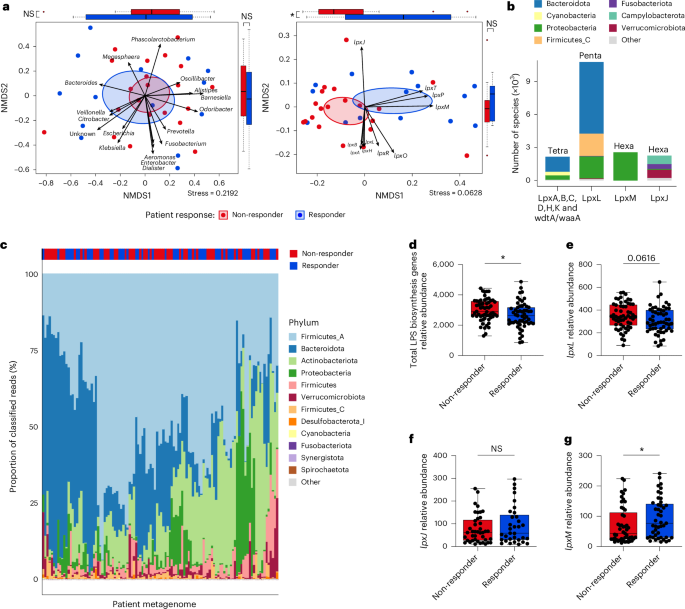Gut microbiota-derived hexa-acylated lipopolysaccharides enhance cancer immunotherapy responses
IF 20.5
1区 生物学
Q1 MICROBIOLOGY
引用次数: 0
Abstract
The gut microbiome modulates immunotherapy treatment responses, and this may explain why immune checkpoint inhibitors, such as anti-PD-1, are only effective in some patients. Previous studies correlated lipopolysaccharide (LPS)-producing gut microbes with poorer prognosis; however, LPS from diverse bacterial species can range from immunostimulatory to inhibitory. Here, by functionally analysing faecal metagenomes from 112 patients with melanoma, we found that a subset of LPS-producing bacteria encoding immunostimulatory hexa-acylated LPS was enriched in microbiomes of clinical responders. In an implanted tumour mouse model of anti-PD-1 treatment, microbiota-derived hexa-acylated LPS was required for effective anti-tumour immune responses, and LPS-binding antibiotics and a small-molecule TLR4 antagonist abolished anti-PD-1 efficacy. Conversely, oral administration of hexa-acylated LPS to mice significantly augmented anti-PD-1-mediated anti-tumour immunity. Penta-acylated LPS did not improve anti-PD-1 efficacy in vivo and inhibited hexa-acylated LPS-induced immune activation in vitro. Microbiome hexa-acylated LPS therefore represents an accessible predictor and potential enhancer of immunotherapy responses. Hexa-acylated lipopolysaccharides from the gut microbiota are associated with efficacy in patients with cancer receiving anti-PD-1 and stimulate host immune activation for enhanced anti-tumour immunity in mouse models.


肠道微生物来源的六酰化脂多糖增强癌症免疫治疗反应
肠道微生物组调节免疫疗法的治疗反应,这可以解释为什么免疫检查点抑制剂,如抗pd -1,只对一些患者有效。先前的研究将产生脂多糖(LPS)的肠道微生物与较差的预后联系起来;然而,来自不同细菌种类的LPS可以从免疫刺激到抑制。通过对112名黑色素瘤患者的粪便宏基因组进行功能分析,我们发现产生LPS的细菌子集编码免疫刺激六酰化LPS,在临床应答者的微生物组中富集。在抗pd -1治疗的植入肿瘤小鼠模型中,微生物来源的六酰化LPS需要有效的抗肿瘤免疫反应,而LPS结合抗生素和小分子TLR4拮抗剂会破坏抗pd -1的功效。相反,小鼠口服六酰化LPS可显著增强抗pd -1介导的抗肿瘤免疫。五酰化脂多糖在体内没有提高抗pd -1的功效,在体外抑制六酰化脂多糖诱导的免疫激活。因此,微生物组六酰化LPS代表了一种可接近的预测因子和免疫治疗反应的潜在增强剂。
本文章由计算机程序翻译,如有差异,请以英文原文为准。
求助全文
约1分钟内获得全文
求助全文
来源期刊

Nature Microbiology
Immunology and Microbiology-Microbiology
CiteScore
44.40
自引率
1.10%
发文量
226
期刊介绍:
Nature Microbiology aims to cover a comprehensive range of topics related to microorganisms. This includes:
Evolution: The journal is interested in exploring the evolutionary aspects of microorganisms. This may include research on their genetic diversity, adaptation, and speciation over time.
Physiology and cell biology: Nature Microbiology seeks to understand the functions and characteristics of microorganisms at the cellular and physiological levels. This may involve studying their metabolism, growth patterns, and cellular processes.
Interactions: The journal focuses on the interactions microorganisms have with each other, as well as their interactions with hosts or the environment. This encompasses investigations into microbial communities, symbiotic relationships, and microbial responses to different environments.
Societal significance: Nature Microbiology recognizes the societal impact of microorganisms and welcomes studies that explore their practical applications. This may include research on microbial diseases, biotechnology, or environmental remediation.
In summary, Nature Microbiology is interested in research related to the evolution, physiology and cell biology of microorganisms, their interactions, and their societal relevance.
 求助内容:
求助内容: 应助结果提醒方式:
应助结果提醒方式:


